Quantitative Aptitude Questions with Answers and Solution for SSC CGL- Mock Test of Maths MCQs set for online practice of upcoming Competitive exams.
Subject : Quantitative Aptitude (Mathematics)
Medium : English
Level : SSC CGL
All type Questions with Solution
As per latest exam pattern and syllabus
Set of 25 Questions – New Questions practice Set in Every Attempt
Results
#1. The sum lent at 5% per annum (i.e., 365 days) simple interest that produces interest, of Rs 2.00 per day is :

#2. Three years ago, the average age of a family of 5 members was 17 years. A baby having been born, the average age of the family is the same today. The present age of the baby (in year/s) is :

#3. If the cost price of 10 articles equals selling price of 9 articles, the gain or loss percent will be :

#4. The greatest value among the fractions 
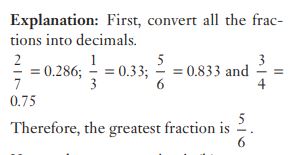
#5. A table with marked price Rs 1200 was sold to a customer for Rs 1100. Find the rate of discount allowed on the table.
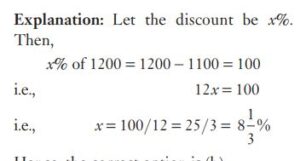
#6. A person can row a distance of one km upstream in ten minutes and downstream in four minutes. What is the speed of the stream?
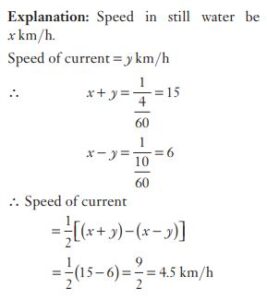
#7. By walking at  of his usual speed, a man reaches his office 20 minutes later than his usual time. The usual time taken by him to reach his office is :
of his usual speed, a man reaches his office 20 minutes later than his usual time. The usual time taken by him to reach his office is :

#8. Find the value of 
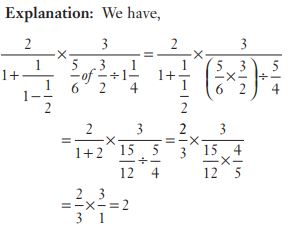
#9. If the difference between S.I. and C.I. for 2 years on a sum of money lent at 5% is Rs 6, then the sum is :
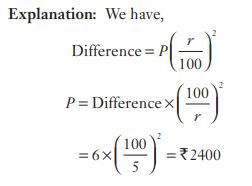
#10. The simple interest on Rs 7300 from 11 May 1987 to 10 September 1987 (both days included) at 5% per annum is :

#11. The difference between the value of the number increased by 20% and the value of the number decreased by 25% is 36. Find the number :

#12. If the discount is equal to one fifth of the marked price and the loss is half the discount, then the percentage of loss is :
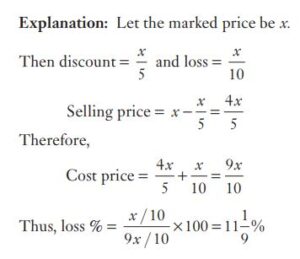
#13. Ravi buys an article with a discount of 25% on its marked price. He makes a profit of 10% by selling it at Rs 660. The marked price of the article was :
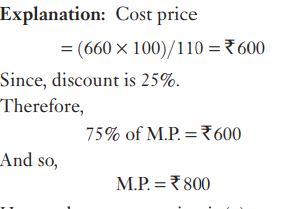
#14. The average weight of 8 persons increases by 2.5 kg when a new person comes in place of one of them weighing 65 kg. The weight of the new person is :
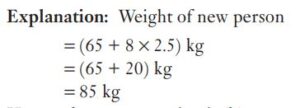
#15. The average marks of a class of 35 children is 35. The marks of one of the students, who got 35, was incorrectly entered as 65. What is the correct average of the class?
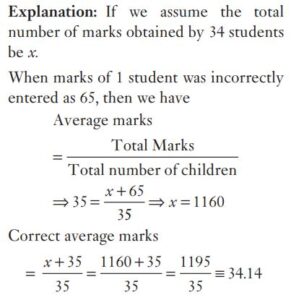
#16. The value of is 
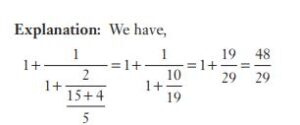
#17. Pipe A can fill a tank in 4 hours and pipe B can fill it in 6 hours. If they are opened on alternate hours and if pipe A is opened first, in how many hours, the tank shall be full?
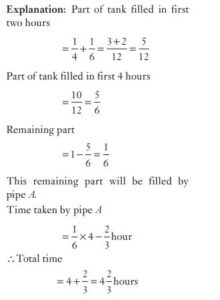
#18. The cost of manufacturing an article was Rs 900. The trader wants to gain 25% after giving a discount of 10%. The marked price must be :
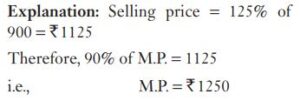
#19.
If W1 : W2 = 2 : 3 and W1 : W3= 1 : 2 then W2 : W3 is
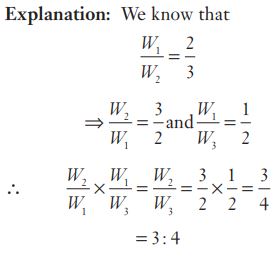
#20. By selling an article for Rs 102, there is a loss of 15%, when the article is sold for Rs 134.40. The net result in the transaction is

#21. If the price of a commodity is increased by 50%, by what fraction must its consumption be reduced so as to keep the same expenditure on its consumption?

#22. The least number which when divided by 4, 6, 8, 12 and 16 leaves a remainder of 2 in each case is :
L.C.M. of 4, 6, 8, 12 and 16 = 48
Required number = 48 2 = 50
#23. A boat takes half time in moving a certain distance downstream than upstream. The ratio of the speed of the boat in still water and that of the current is :
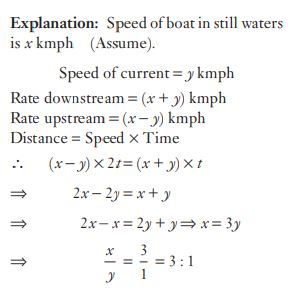
#24. The HCF (GCD) of a, b is 12, a, b are positive integers and a > b > 12. The smallest values of (a, b) are respectively
HCF of a and b = 12
Numbers = 12x and 12y where x and y are prime to each other.
a > b > 12
a = 36; b = 24
#25. A retailer buys a radio for Rs 225. His overhead expenses are Rs 15. He sells the radio for Rs 300. The profit per cent of the retailer is :
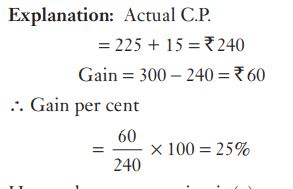
Thank you so much